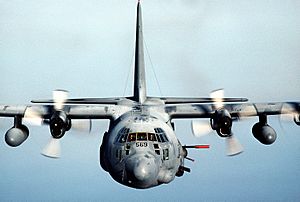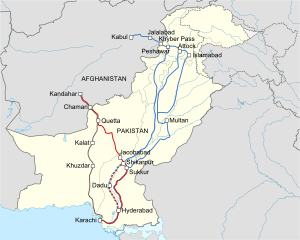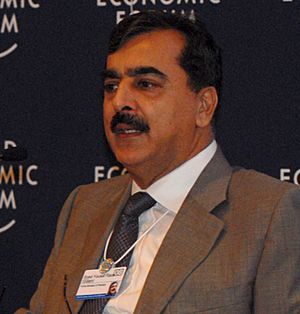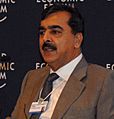2011 NATO attack in Pakistan facts for kids
Quick facts for kids 2011 NATO attack in Pakistan |
|||||||
|---|---|---|---|---|---|---|---|
| Part of the Pakistan–United States skirmishes | |||||||
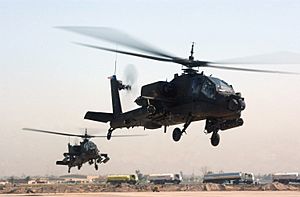 Two American Apache helicopters, along with other aircraft, attacked Pakistani posts |
|||||||
|
|||||||
| Belligerents | |||||||
| Commanders and leaders | |||||||
| Unknown | |||||||
| Strength | |||||||
|
|
||||||
| Casualties and losses | |||||||
|
None | ||||||
The 2011 NATO attack in Pakistan (also known as the Salala incident) was a border fight between United States-led NATO forces and Pakistani soldiers. It happened at two Pakistani military posts along the Afghanistan–Pakistan border on November 26, 2011. Both sides later said the other had fired first.
Two NATO Apache helicopters, an AC-130 gunship, and two F-15E Eagle fighter jets flew into Pakistani territory. They came from Afghanistan and fired at two Pakistani border posts. This attack killed 28 Pakistani soldiers and injured 12 others.
This event made relations between Pakistan and the United States much worse. People in Pakistan protested across the country. The Pakistani government also took actions that affected the American plan to leave Afghanistan. These actions included asking the U.S. military to leave Shamsi Airfield and closing the NATO supply line through Pakistan.
On July 3, 2012, United States Secretary of State Hillary Clinton officially said sorry for the Pakistani soldiers who died. After this apology, Pakistan reopened the NATO supply routes.
What happened
The attack
On November 26, 2011, U.S.-led NATO forces attacked two Pakistani border posts near the Pakistan-Afghanistan border. The attack happened around 2:00 AM local time.
According to Pakistani military officials, the attack was a planned NATO strike. It involved two AH-64D Apache Longbow helicopters, an AC-130H Spectre gunship, and two F-15E Eagle fighter jets. A MC-12W Liberty aircraft was also used to gather information and watch the area.
The posts were located inside Pakistan, in an area called Salala. The attacks killed up to 24 Pakistani soldiers, including two officers, Major Mujahid Mirani and Captain Usman Ali. Thirteen other soldiers were hurt.
Both sides claimed they were attacked first. The border in this area is not clearly marked. Also, Taliban fighters often move around the Afghan border regions. These factors might have played a part in the incident.
U.S. and Afghan claims
Officials from Afghanistan and the U.S. said the incident began when their forces were fighting the Afghan Taliban in Afghanistan. They claimed they were fired upon from positions inside Pakistan. An Afghan official said, "There was firing coming from the position against Afghan army soldiers who requested support."
Another Western official agreed, saying, "They were fired on from a Pakistani army base." They called it a "defensive action." Helicopters were then called in to help.
A Pakistani defense official reportedly admitted that soldiers at the Pakistani border post fired some flares, mortar rounds, and machine-gun bursts in that direction.
U.S. officials also mentioned a past event in September 2010. In that incident, a NATO helicopter fired on a Pakistan outpost, killing two soldiers. They suggested that sometimes, fighters use empty Pakistani border bases to launch attacks.
One U.S. official said NATO forces had told the Pakistani army that operations against Taliban fighters would happen that day. Pakistani General Abbas confirmed that coalition forces had "informed our military earlier... that they will be conducting an operation there."
The U.S. military stated that information about the planned strike was shared at border centers where both sides exchange information to avoid accidental firing. They claimed Pakistani officers approved the strike, saying no Pakistani forces were in the area.
Pakistani claims
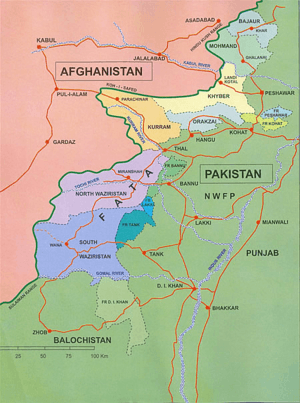
The incident caused anger in Pakistan. They called the attack "unprovoked and indiscriminate firing," an "irresponsible act," and a "clear violation" of their country's independence. Pakistani military leaders believed NATO's attacks were planned and intentional.
Pakistan rejected claims that their side fired first. They said the soldiers at the post were asleep when NATO attacked at night. The spokesperson for the Pakistani military, Major General Athar Abbas, challenged NATO to "present proof if they claim that firing was started from Pakistani side. No fire was opened from our side." He said NATO and Afghanistan were trying to make excuses.
Early reports from the Pakistan Army said about 40 soldiers were at the two posts. Most were sleeping or resting when the attack happened.
The helicopters first attacked the "Volcano" border post on a mountain peak. This attack cut off all communication, so the Pakistan Air Force could not be called for help in time. Instead, Pakistani troops at a nearby post called "Boulder" fired at the NATO helicopters with anti-aircraft guns. The helicopters soon left.
Pakistani officials tried to contact NATO to explain the situation, but their request reportedly did not reach the attacking force. The helicopters returned a second time and attacked the "Boulder" post again. A short while later, communication with NATO commanders was made, and the attack was stopped. All the deaths were from the first attack on the "Volcano" post. Major General Abbas later said it was hard to understand why NATO forces attacked a second time.
Local officials said there was no militant activity along the Afghan border when NATO attacked. Abbas said the locations of the two border posts had been given to ISAF (International Security Assistance Force). He added that the attack lasted for almost two hours. He claimed that Pakistani personnel told their headquarters, which immediately informed the ISAF base in Afghanistan to stop the attack, but they did not. Pakistani headquarters then gave permission for their troops to fight back. NATO communicated around 1:15 AM that they realized they were attacking the Pakistan Army and had ordered their forces to stop. Yet, NATO's air attack continued with another round aimed at Pakistani rescue forces.
Pakistan called the event an "unprovoked and indiscriminate firing," an "irresponsible act," and a "clear violation" of its independence. This attack was the deadliest NATO strike on Pakistani land since the war in Afghanistan began.
Pakistani military officials said this was not an "unintended" incident. They claimed NATO was informed during the attack, but their helicopters kept attacking. Pakistan was invited to help investigate the incident, but they refused.
On December 9, Major General Ashfaq claimed that NATO had been listening to radio messages that night and knew they had hit the Volcano post.
The Pakistani military called the strike "unprovoked and indiscriminate." The Government of Pakistan strongly protested to the U.S. and immediately stopped supplies to NATO troops in Afghanistan. This attack happened just one day after General John Allen, the U.S.-led coalition commander in Afghanistan, met with Pakistani army chief General Ashfaq Parvez Kayani to discuss border coordination.
Results of the incident
Closure of NATO supply lines
Pakistan immediately closed all NATO supply routes to Afghanistan after the attack. This left supply trucks stuck and open to attacks. NATO trucks had been using routes through Pakistan to supply U.S. and international forces fighting in Afghanistan.
U.S. officials tried to find other routes through Russia, Kazakhstan, Uzbekistan, and Tajikistan. These "Northern Distribution Network" routes were longer and less effective than those through Pakistan. They also cost a lot more money. Afghanistan, being a landlocked country, relies heavily on Pakistan for its imports. In January 2012, the U.S. was paying six times more to send supplies to troops in Afghanistan using these alternative routes.
Ongoing issues
In March 2012, a U.S. military official said the United States would have to use the Northern Distribution Network if Pakistan did not reopen its supply lines. However, he admitted these routes were expensive. Negotiations with Pakistan continued.
After reviewing relations, the Pakistani parliament gave the government the decision to reopen the NATO supply lines in April 2012. Due to upcoming elections and strong anti-American feelings in Pakistan, the government was slow to act. They waited for the U.S. to respond positively to Pakistani demands. These demands included a U.S. apology for the November 2011 incident, bringing those responsible to justice, and stopping U.S. drone strikes.
Talks between Pakistan and the U.S. failed in April 2012 because Pakistan could not get an unconditional apology. The White House refused to apologize after attacks in Afghanistan in April 2012. U.S. officials claimed these attacks came from a group working from Pakistan. Pakistani officials said they could not open the NATO supply routes without a U.S. apology.
Later in May, Pakistan asked the U.S. to pay high fees to open the routes. The U.S. could not pay the requested $5,000 per truck due to budget limits.
Supply lines reopening
Pakistan decided to reopen the supply lines after the U.S. Secretary of State apologized on July 3, 2012. This apology came during a phone call to Pakistani Foreign Minister Hina Rabbani Khar. Secretary Clinton said, "We are sorry for the losses suffered by the Pakistani military. We are committed to working closely with Pakistan and Afghanistan to prevent this from ever happening again."
Pakistani reactions to the apology were mixed. Some appreciated it, hoping for better relations. Others criticized the government for not getting more from the U.S., like higher transit fees. Opposition politicians demanded more explanation. Some Pakistanis even promised to protest and stop the convoys. The Pakistani Taliban announced they would attack any NATO supply trucks.
U.S. officials said that Hillary Clinton's good relationship with Pakistani Foreign Minister Hina Rabbani Khar helped solve the problem. After weeks of talks, both sides agreed:
- Pakistan dropped its demand for higher transit fees and kept the fee at $250 per truck.
- The U.S. government would ask Congress to pay Pakistan about $1.2 billion for costs of Pakistani troops fighting militants along the border. These payments had been stopped when Pakistan closed the routes.
Pakistan's Defense Committee approved the deal, saying it was good for the country and for peace in Afghanistan. Allowing NATO convoys would help Western forces leave Afghanistan faster. The agreement showed that Pakistani officials realized they might have pushed too hard. It also showed that both sides understood the conflict could permanently harm their relationship.
The deal ended a diplomatic problem that had almost stopped U.S. relations with Pakistan. The closure of supply lines cost the U.S. over $1 billion in extra shipping fees. It also delayed thousands of armored vehicles and other equipment for the Afghan army and police. Reopening the lines meant the U.S. would save hundreds of millions of dollars as NATO forces leave Afghanistan.
The agreement was not just about money. For the Pakistani army, it was about honor. They wanted an apology. The U.S. had been slow to apologize because of anger over U.S. soldiers dying in Afghanistan from attacks by groups linked to Pakistan's intelligence agency. Also, U.S. investigators believed Pakistani soldiers had fired first in the Salala incident, making Pakistan equally responsible. Pakistan denied this.
After the first NATO supply trucks crossed the Afghan border on July 5, 2012, some Pakistanis still questioned the deal. Opposition leaders criticized it, saying it was against national interest. Pakistan declared it would check all NATO containers to ensure they did not contain weapons. Truck owners would receive compensation for the seven months they were out of work.
Shamsi Airfield vacated
On November 26, the same day as the attack, Pakistan told the U.S. to close and leave Shamsi Airfield in Balochistan province within 15 days. The U.S. forces and the Central Intelligence Agency had reportedly used this airbase since 2001 for surveillance and launching drone attacks against militants. Shamsi airbase was the only military base in Pakistan used by the United States. The order to leave showed how much relations between Pakistan and the U.S. were getting worse.
In early December, U.S. military personnel and equipment left the base and moved to Bagram Air Base in Afghanistan. On December 10, Pakistani troops took full control of the airfield. The U.S. flag was removed and replaced with the flag of Pakistan.
The impact of this closure was debated. The U.S. could still conduct drone attacks from bases in Afghanistan. Pakistani military said the base was mainly for refueling and maintenance of drones, not for actual drone operations, which had already stopped in April 2011. After the incident, Pakistan said it would shoot down any future U.S. drones entering its airspace. The U.S. stopped drone operations to avoid further angering Pakistan.
U.S. exit strategy
One immediate result of the incident was that U.S. efforts to end the war in Afghanistan peacefully might be in danger. Some Pakistani officials warned the attack could have "huge implications" for the Afghan situation. Pakistan, which is a key partner for the U.S. in talks with the Afghan Taliban, had already stopped those efforts.
The Pakistani Foreign Minister, Hina Rabbani Khar, warned that another such incident could end Pakistan's support to the U.S. in its fight against militants. She said, "Enough is enough. The government will not tolerate any incident of spilling even a single drop of any civilian or soldier's blood." She added that Pakistan's sacrifices in the fight against terrorism should not be ignored.
Pakistan's refusal to attend Bonn Conference
After the NATO attacks, the Pakistani government refused to attend the Bonn conference on December 5, 2011. This was an important international meeting about Afghanistan. International pressure grew on Pakistan, but they still refused to attend. Secretary Hillary Clinton called the Pakistani Prime Minister, but her request was denied because Pakistani public opinion was against attending. The conference was generally seen as a disappointment, partly because Pakistan was not there.
Changes to border rules
Pakistan also made its air defenses stronger and increased surveillance along the Afghanistan border. This was to prevent any future attacks. Major General Ashaq Nadeem said, "We can expect more attacks from our supposed allies." Pakistan's army chief, General Ashfaq Parvez Kayani, told commanders at the border to fire without permission if any more aggression happened.
According to a Pakistani security official, Pakistan had upgraded its "fully equipped air defense system" on the Afghan border. This system can detect, track, and shoot down any aircraft. These weapons include shoulder-to-air Anza Mk-III missiles and anti-aircraft guns. The Pakistan Air Force canceled all leave for its air reconnaissance staff and started round-the-clock air patrols over the Afghan border to prevent any intrusions, including drone attacks.
Reactions
The relationship between Pakistan and the United States, which was already difficult, became even worse after the incident. The Pakistani government and military began to rethink their relationship with the U.S.
Government and military
The Foreign Ministry of Pakistan quickly protested to U.S. Ambassador to Pakistan Cameron Munter. Foreign Minister Hina Rabbani Khar said the attacks showed "complete disregard for international law and human life" and were a "stark violation of Pakistani sovereignty." Pakistani military leaders believed the attack was a deliberate plan.
Retired Brigadier Mahmood Shah, a former security chief, said the U.S. had blamed Pakistan for everything happening in Afghanistan. He advised Pakistan to shoot down NATO aircraft if similar events happened again and to keep the supply lines closed. The military's media wing called the attack unprovoked. General Ashfaq Parvez Kayani said the incident was unacceptable and ordered strong action.
General Ahmad Shuja Pasha, a top military leader, became very against Washington. He argued with the CIA director, reduced cooperation, and ordered harassment of U.S. diplomats.
The Pakistani Senate passed a resolution condemning the attack. Pakistan's Interior Minister said the supply lines were not just suspended but permanently shut down. The Information Minister urged the international community to condemn the incident. The Governor of Khyber Pakhtunkhwa called the air strike "deliberate."
A televised funeral for the soldiers was held in Peshawar. Many high-ranking military and political figures attended. The soldiers' families said they were proud of their sacrifices. The Army Chief also visited the injured soldiers in the hospital.
On November 28, 2011, the Pakistani Prime Minister announced that relations with the U.S. would "never be the same again." The military's spokesperson later said NATO's apology was not accepted. He stated that such incidents had happened before, killing many Pakistani soldiers. Major-General Ashfaq Nadeem called the Salala incident a "deliberate act of aggression" and said it was "next to impossible" that NATO did not know they were attacking Pakistani forces.
The next day, Pakistan's ambassador to the UN wrote a letter to the UN Secretary General, informing him of the situation.
A senior Pakistani official said that U.S. drone aircraft "will never be allowed back" in Pakistan. He hinted that American military trainers might be allowed back. Pakistan had previously asked American security personnel to leave after the operation that killed Osama bin Laden in May 2011. In January 2012, Foreign Minister Hina Rabbani Khar said Pakistan's ties with the U.S. were "still on hold."
I would like the American public to consider what their reaction would have been if American troops had been killed in such an attack on their border with Mexico.
In May 2012, Bilawal Bhutto Zardari, the son of President Zardari, asked President Obama to "show some courage" and "apologise to Pakistan." He criticized U.S. drone operations and questioned if the U.S. truly saw Pakistan as a military ally.
Public and media
The NATO attack caused much anger among the public and media in Pakistan. Many saw it as a planned act of war. Numerous protests were held in several cities for days after the attack. People demanded an end to the U.S. alliance and wanted the government to leave the War on Terror. They also wanted all NATO supplies stopped and American citizens expelled. Some locals demanded that those who carried out the attack be handed over to Pakistan.
Hundreds of people protested outside the American consulate in Karachi. Lawyers' groups boycotted court proceedings. Many university students also protested. Students in Peshawar blocked a main road, chanting "Quit the war on terror" and other anti-American slogans. Schoolteachers and students in Azad Kashmir also protested.
Some university faculty members supported the Pakistan Army, saying, "Pakistan does not want war, but war is being imposed on it." They called the War on Terror a "drama" by the "U.S. elite." Local TV cable operators stopped showing Western channels like BBC World News, claiming they had an "anti-Pakistan bias."
Leaders of Pakistani Christian communities also condemned the attack and supported the armed forces. They called for a UN investigation. Religious leaders from Hindu, Sikh, Muslim, Christian, and Baháʼí communities also condemned the incident during a meeting.
Reaction by the U.S. and NATO
The White House said senior American officials had expressed their sadness to Pakistan. They said they wanted to work together to find out what happened and were committed to their partnership with Pakistan. U.S. Secretary of State Hillary Clinton and Defense Secretary Leon Panetta spoke to their Pakistani counterparts, giving their "deepest condolences." They also supported a NATO investigation.
The commander of the International Security Assistance Force (ISAF) said he was paying "the highest attention" to the matter. The Obama administration promised cooperation and ordered a full investigation. A few days later, President Barack Obama personally called President Asif Ali Zardari to express his sorrow. He said the incident was not a deliberate attack and promised a full investigation, but he did not offer a formal apology.
A NATO spokesman said NATO "regrets the loss of life of any Pakistani servicemen."
On November 27, 2011, NATO apologized for what it called a "tragic unintended incident." NATO chief Anders Fogh Rasmussen wrote to Prime Minister Yousuf Raza Gilani, saying that "the deaths of Pakistani personnel are as unacceptable and deplorable as the deaths of Afghan and international personnel."
The U.S. Chief of Army Staff, General Martin Dempsey, said Pakistan's anger was justified. However, Dempsey did not apologize, saying he did not know enough about the incident. A senior advisor to Afghan President Hamid Karzai warned that Pakistan and Afghanistan might be heading toward military conflict. Hamid Karzai called the Pakistani Prime Minister to offer his condolences.
The ISAF commander, General John R. Allen, offered condolences to the families of the dead soldiers and ordered a "thorough investigation."
At the same time, U.S. senators like John McCain and Lindsey Graham said the United States needed to "fully review" its ties with Pakistan. They suggested cutting or restricting military and economic aid.
I would like to extend my most sincere condolences to the people and government of Pakistan, and especially to Pakistan's men and women in uniform, for the tragic incident that took place on 26 November in Mohmand Agency. My thoughts and prayers are with the families of the men who died. Hamey bohat afsos hay (we are deeply saddened).
Dennis J. Kucinich, a U.S. Congressman, said the United States must apologize to Pakistan and pay money to the soldiers' families.
The U.S. embassy in Islamabad released a video statement featuring Ambassador Cameron Munter. He expressed his regrets and promised a "full, in-depth investigation." He also said that Pakistan and the United States had been friends for over 60 years and would overcome this crisis.
International reaction
By country
 China: The Chinese Ministry of Foreign Affairs expressed "strong concerns" and was "deeply shocked" by the attack. They said that "Pakistan's independence, sovereignty and territorial integrity should be respected."
China: The Chinese Ministry of Foreign Affairs expressed "strong concerns" and was "deeply shocked" by the attack. They said that "Pakistan's independence, sovereignty and territorial integrity should be respected." Denmark: The foreign minister of Denmark sent a letter to express condolences. He said, "No country is so hard hit as Pakistan."
Denmark: The foreign minister of Denmark sent a letter to express condolences. He said, "No country is so hard hit as Pakistan." France: A spokesman for the French Foreign Ministry offered condolences for the "tragic and regrettable events" and called for cooperation with Pakistan.
France: A spokesman for the French Foreign Ministry offered condolences for the "tragic and regrettable events" and called for cooperation with Pakistan. Germany: Guido Westerwelle, Foreign Minister of Germany, expressed sadness and supported an investigation.
Germany: Guido Westerwelle, Foreign Minister of Germany, expressed sadness and supported an investigation. Iran: Major General Mohammad Ali Jafari condemned the NATO air raid, calling it a "horrible crime" and a "violation of international laws."
Iran: Major General Mohammad Ali Jafari condemned the NATO air raid, calling it a "horrible crime" and a "violation of international laws." Italy: Italian foreign minister Giulio Terzi expressed sadness and said Pakistan was important for stability in Afghanistan.
Italy: Italian foreign minister Giulio Terzi expressed sadness and said Pakistan was important for stability in Afghanistan. Russia: The Russian foreign minister said it is wrong to violate a country's independence, even during counter-insurgent operations.
Russia: The Russian foreign minister said it is wrong to violate a country's independence, even during counter-insurgent operations. Sri Lanka: Thousands of Sri Lankan protesters condemned NATO's actions and asked the U.S. to "stop terrorizing Pakistan."
Sri Lanka: Thousands of Sri Lankan protesters condemned NATO's actions and asked the U.S. to "stop terrorizing Pakistan." Turkey: The Turkish Minister for Foreign Affairs called the attack "unprovoked and totally unacceptable." He promised that Turkey, as a NATO member, would ask for a fair investigation.
Turkey: The Turkish Minister for Foreign Affairs called the attack "unprovoked and totally unacceptable." He promised that Turkey, as a NATO member, would ask for a fair investigation. United Arab Emirates: Sheikh Abdullah bin Zayed Al Nahyan, the Foreign Affairs Minister, visited Islamabad and asked President Asif Ali Zardari to reconsider the deadline for the U.S. to leave Shamsi Airbase. President Zardari rejected the request.
United Arab Emirates: Sheikh Abdullah bin Zayed Al Nahyan, the Foreign Affairs Minister, visited Islamabad and asked President Asif Ali Zardari to reconsider the deadline for the U.S. to leave Shamsi Airbase. President Zardari rejected the request.
Organizations
 United Nations: The UN Security Council received a letter from Pakistan about the situation.
United Nations: The UN Security Council received a letter from Pakistan about the situation. Organisation of Islamic Cooperation (OIC): The Secretary General condemned the NATO attacks, calling them a "serious violation of Pakistan's sovereignty" and "totally unacceptable."
Organisation of Islamic Cooperation (OIC): The Secretary General condemned the NATO attacks, calling them a "serious violation of Pakistan's sovereignty" and "totally unacceptable." European Union: Catherine Ashton offered condolences and said, "Pakistan is a vital partner in the region and has an essential role to play in the resolution of the Afghan conflict."
European Union: Catherine Ashton offered condolences and said, "Pakistan is a vital partner in the region and has an essential role to play in the resolution of the Afghan conflict."
Awards for bravery
Some soldiers received awards for their bravery:
- Major Mujahid Ali Mirani Shaheed received the Sitara-e-Jurat.
- Captain Usman Ali Shaheed received the Tamgha-e-Basalat.
Images for kids


